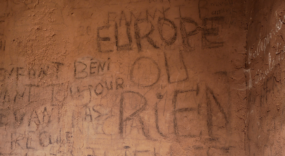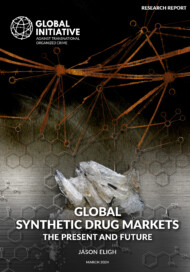Posted on 31 Aug 2023
In the wake of the Russian invasion of Ukraine, Europe showed unprecedented unity in providing Ukraine with comprehensive and sustained support. As international cooperation has become a significant tool in countering organized crime, Europe’s cooperation has shown that a more effective approach can also be adopted to curb the growing levels of crime in the world.
International cooperation has been identified as one of the cornerstones in the response to organized crime. Its importance has become even more apparent in the face of a recent pandemic, civil unrest and war. As organized crime is increasingly a transnational phenomenon, extending its tentacles across borders, collaboration between states will become an ever more crucial means of combating such threats.
In the 2021 Global Organized Crime Index, international cooperation received the highest global score among the resilience indicators, at 5.68, suggesting that most countries in the world are at least willing to cooperate to strengthen their capacity to counter organized crime. The level of international cooperation on the European continent was significantly higher (7.02) than elsewhere. Although this indicator scored below the global average in Asia and Africa (5.27 and 4.79, respectively), it remained the highest-scoring resilience indicator overall.
Despite political rhetoric about the importance of international cooperation in responses to organized crime, concerns have long been raised about the effectiveness of existing multilateral cooperation mechanisms and their tangible results in effectively tackling transnational challenges. The inertia that characterizes mutual legal assistance, the general reluctance to engage in extradition processes and the complexity of formal cooperation instruments have made international cooperation inadequate in responding to such challenges. This discrepancy is also reflected in the Index, where high levels of international cooperation have not translated into low levels of organized crime in most countries.
Although there may still be some regional shortfalls in international cooperation and a need for more concerted efforts to strengthen responses to transnational organized crime, recent multilateral efforts and the unwavering unity of several countries, particularly European Union member states, in the face of Russia’s invasion of Ukraine may give some hope that similar cooperation would shape the policy response to organized crime.
A united front
Following Russia’s invasion of Ukraine in February 2022, European states showed immediate solidarity for Ukraine. In contrast to their arguably more indifferent response to the annexation of the Crimea and Donbas regions in 2014, European states have collectively demonstrated their unwavering support for Ukraine by supplying arms and other military assistance (an unprecedented move at the time for the EU), and providing billions of euros in financial, humanitarian and emergency aid to Ukraine.
In addition, European countries implemented restrictive financial measures on Russia, such as freezing and seizing the assets of Russian oligarchs, suspending a number of Russian financial institutions from the SWIFT banking system, banning the import of certain goods from Russia and closing EU airspace, seaports and roads to Russian vehicles.
While European countries, together with their international counterparts, continue to provide humanitarian aid, either in kind or through funding, to address the short-term effects of the war, EU member states are also working with Ukraine to rebuild the country’s infrastructure and to restore its shrunken economy through substantial financial aid. This was reaffirmed at the second iteration of the Ukraine Recovery Conference, hosted by the United Kingdom on 21–22 June 2023, where further commitments were made by individual states as well as a push by European countries to encourage private sector engagement and investment in Ukraine.
A path to follow
Although in the early stages of the war resources were primarily allocated to humanitarian and military assistance, cross-border law enforcement cooperation has since been prioritized to tackle both existing and emerging criminal markets. In this respect, European countries have broadened the scope of their cooperation by working closely with Ukrainian officials to mitigate certain criminal markets exacerbated by the war, including arms and human trafficking. Immediately after the war started, a joint anti-trafficking plan was implemented to prevent human trafficking and to identify and assist victims of trafficking in cooperation with the Ukrainian authorities and international organizations. European countries and Europol have also been working with their Ukrainian counterparts and have set up special centres to reduce arms trafficking in the region following the proliferation of arms and ammunition amassing in Ukraine.
European states are also committed to assisting Ukraine in the areas of judicial reform, and strengthening the rule of law and anti-corruption mechanisms. The EU Anti-Corruption Initiative has continued to work closely with its Ukrainian counterparts to ensure that the country’s recovery is transparent and that Ukraine’s history of corruption in the public sector does not interfere with this process.
These initiatives show that European countries are willing to go the extra mile by extending their cooperation beyond direct aid to the war-torn country and its victims. While these efforts were not isolated, with other countries such as the United States making significant contributions and working with Ukraine and the EU to help the country, the united approach of the European continent has been unparalleled. European countries have shown unexpected resilience and solidarity by cooperating with each other, with other countries and with Ukraine, demonstrating that they have the tools and mechanisms for effective international cooperation that can be called upon in times of urgent need. This cooperation should serve as an example in the multilateral response to organized crime and of how to achieve more tangible and lasting results – especially at a time when the multilateral coalitions we have so long taken for granted are disintegrating.
This analysis is part of the GI-TOC’s series of articles delving into the results of the Global Organized Crime Index 2021. The series explores the Index’s findings and their effects on policymaking, anti-organized crime measures and analyses from a thematic or regional perspective.



